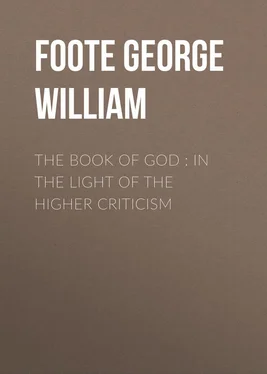George Foote - The Book of God - In the Light of the Higher Criticism
Здесь есть возможность читать онлайн «George Foote - The Book of God - In the Light of the Higher Criticism» — ознакомительный отрывок электронной книги совершенно бесплатно, а после прочтения отрывка купить полную версию. В некоторых случаях можно слушать аудио, скачать через торрент в формате fb2 и присутствует краткое содержание. Жанр: foreign_religion, foreign_antique, foreign_prose, на английском языке. Описание произведения, (предисловие) а так же отзывы посетителей доступны на портале библиотеки ЛибКат.
- Название:The Book of God : In the Light of the Higher Criticism
- Автор:
- Жанр:
- Год:неизвестен
- ISBN:нет данных
- Рейтинг книги:4 / 5. Голосов: 1
-
Избранное:Добавить в избранное
- Отзывы:
-
Ваша оценка:
- 80
- 1
- 2
- 3
- 4
- 5
The Book of God : In the Light of the Higher Criticism: краткое содержание, описание и аннотация
Предлагаем к чтению аннотацию, описание, краткое содержание или предисловие (зависит от того, что написал сам автор книги «The Book of God : In the Light of the Higher Criticism»). Если вы не нашли необходимую информацию о книге — напишите в комментариях, мы постараемся отыскать её.
The Book of God : In the Light of the Higher Criticism — читать онлайн ознакомительный отрывок
Ниже представлен текст книги, разбитый по страницам. Система сохранения места последней прочитанной страницы, позволяет с удобством читать онлайн бесплатно книгу «The Book of God : In the Light of the Higher Criticism», без необходимости каждый раз заново искать на чём Вы остановились. Поставьте закладку, и сможете в любой момент перейти на страницу, на которой закончили чтение.
Интервал:
Закладка:
The truth is that the Bible is steeped in superstition and supernaturalism. Its cosmogony, its conception of man's origin and position in the universe, its infantile legends, its miracles and magic, its theory of madness and disease, its doctrine of the external efficacy of prayer, its idea that man's words and wishes avail to change the sweep of universal forces and the operation of their immutable laws: all this is in direct opposition to the letter and spirit of Science. The special pleading of clergymen like Dr. Farrar may afford a temporary relief to trembling Christians, and keep them for a further term in the fold of faith; but it will never make the slightest impression upon sceptics, unless it fills them with contemptuous pity for a number of clever men who are obliged, for personal reasons, to practise the lowest arts of sophistry.
IV. MIRACLES AND WITCHCRAFT
Dr. Farrar, as we have seen, holds that the Bible is not a revelation in science. The inspired writers were, in such matters, left to their natural knowledge. The Holy Spirit taught them that God made the world and all which it inhabits; but how it was made they only conjectured. The truth, in this respect, was left to the discovery of later ages.
This is a pretty and convenient theory, but it does not provide for every difficulty in the relationship between science and the Bible. There still remain the questions of miracles and witchcraft.
Dr. Farrar does not discuss these questions thoroughly. He only ventures a few observations. In his opinion, the two miracles of the Creation and the Incarnation "include the credibility of all other miracles." We agree with him. Admit creation out of nothing, and you need not be astonished at the transformation of water into wine. Admit the birth of a boy from a virgin mother, and you need not raise physiological objections to the story of a man being safely entertained for three days in a whale's intestines. It is absurd to strain at gnats after swallowing camels. For this reason we are unable to understand Dr. Farrar's fastidiousness. He is ready to believe that some miracles are mistaken metaphors, that some were due to the action of unnoticed or ill-understood natural causes, and that others were providential occurrences instead of supernatural events. All this, however, is but a concession to the sceptical spirit. It is throwing out the children to the wolves. It may stop their pursuit for a little while, but they will come on again, and flesh their jaws upon the parents.
A mixed criterion of true miracles is laid down by Dr. Farrar. They must be (1) adequately attested, and (2) wrought for adequate ends, and (3) in accordance with the revealed laws of God's immediate dealings with man. The second and third conditions are too fanciful for discussion. They are, in fact, entirely subjective. The first condition is the only one which can be applied with decisive accuracy. The miracles must be adequately attested . But was it not David Hume who declared that "in all history" there is not a single miracle attested in this manner? And did not Professor Huxley say that Hume's assertion was "least likely" to be challenged by those who are used to weighing evidence and giving their decision with a due sense of moral responsibility?
It is easy enough to sneer at Hume. It is just as easy to answer what he never said. What the apologists of Christianity have to do is to take a single miracle of their faith and show that it rests upon adequate evidence. Anything short of this is intellectual thimble-rigging.
Dr. Farrar does not face this dreadful task. He treats us, instead, to some personal observations on the Fall, the Tower of Babel, Balaam's ass, Joshua's arrest of the sun and moon, and Jonah's submarine excursion. Let us examine these observations.
No Christian, says Dr. Farrar, is called upon to believe in an actual Garden of Eden and an actual talking serpent. Christians have believed in these things by the million. But that was before the clergy invented "the Higher Criticism" to disarm "infidelity." They know better now. The story of the Fall is false as a narrative. It is true as a "vivid pictorial representation of the origin and growth of sin in the human heart." All the literature of the world has failed to set forth anything "comparable to it in insight." Therefore it is "inspired."
Конец ознакомительного фрагмента.
Текст предоставлен ООО «ЛитРес».
Прочитайте эту книгу целиком, купив полную легальную версию на ЛитРес.
Безопасно оплатить книгу можно банковской картой Visa, MasterCard, Maestro, со счета мобильного телефона, с платежного терминала, в салоне МТС или Связной, через PayPal, WebMoney, Яндекс.Деньги, QIWI Кошелек, бонусными картами или другим удобным Вам способом.
1
Arnold, God and the Bible, pp. 222-3.
2
Dr. Giles, Christian Records, p. 10.
3
It would be a pity to omit an amusing instance of the contemptuous dogmatism of Christian divines when they had the field to themselves. Dr. William Whitaker, a famous learned writer on the side of the Reformation in England, in his Disputation with two of the foremost Jesuits, Bellarmine and Stapleton, wrote as follows: – "Jerome, in the Proem of his Commentaries on Daniel, relates that Porphyry the philosopher wrote a volume against the book of our prophet Daniel, and affirmed that what is now extant under the name of Daniel was not published by the ancient prophet, but by some later Daniel, who lived in the times of Antiochus Epiphanes. But we need not regard what the impious Porphyry may have written, who mocked at all the scriptures and religion itself." Well, this opinion of the blasphemous Porphyry, whose writings were burnt by the Christian Church, is now accepted by the Higher Critics. Canon Driver, for instance, admits that the Book of Daniel is not the work of Daniel, that it could not have been written earlier than 300 B.C., and that "it is at least probable that it was composed under the persecution of Antiochus Epiphanes, B.C. 168 or 167" (Introduction to the Literature of the Old Testament, p. 467). This involves that the fulfilled prophecies of Daniel were written after the events.
Интервал:
Закладка:
Похожие книги на «The Book of God : In the Light of the Higher Criticism»
Представляем Вашему вниманию похожие книги на «The Book of God : In the Light of the Higher Criticism» списком для выбора. Мы отобрали схожую по названию и смыслу литературу в надежде предоставить читателям больше вариантов отыскать новые, интересные, ещё непрочитанные произведения.
Обсуждение, отзывы о книге «The Book of God : In the Light of the Higher Criticism» и просто собственные мнения читателей. Оставьте ваши комментарии, напишите, что Вы думаете о произведении, его смысле или главных героях. Укажите что конкретно понравилось, а что нет, и почему Вы так считаете.












